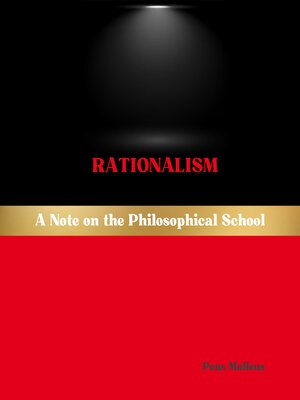Rationalism
audiobook (Unabridged) ∣ A Note on the Philosophical School · Western Philosophical Schools
By Pons Malleus

Sign up to save your library
With an OverDrive account, you can save your favorite libraries for at-a-glance information about availability. Find out more about OverDrive accounts.
Find this title in Libby, the library reading app by OverDrive.



Search for a digital library with this title
Title found at these libraries:
| Library Name | Distance |
|---|---|
| Loading... |
This audiobook is narrated by a digital voice.
Rationalism is one of the great pillars of philosophical inquiry. At its core lies a bold and enduring claim: that reason, independent of sensory experience, is the primary source and test of knowledge. To the rationalist, truth is not something merely seen or felt, but something that can be grasped by the intellect—something deduced, explained, and made certain through logical reasoning. This book is an invitation to explore that bold claim in depth, tracing the development of rationalist thought and understanding its continuing significance in philosophy and beyond.
The philosophical tradition of rationalism is most closely associated with a group of 17th and 18th-century thinkers—René Descartes, Baruch Spinoza, and Gottfried Wilhelm Leibniz—who each offered rigorous systems of thought grounded in reason. For Descartes, the starting point was doubt and the search for indubitable knowledge. For Spinoza, reason was the means by which we could understand both God and nature as part of a single, unified substance. Leibniz envisioned a world of pre-established harmony governed by logical necessity. Though differing in detail, these thinkers were united by the conviction that the mind could, by its own lights, attain fundamental truths.
But rationalism is more than a historical movement. It is also a philosophical disposition—a belief in the power of the human mind to uncover deep structures of reality. It challenges us to look beyond the fleeting and the contingent, to ask whether there are truths that do not change with time or place, and whether the universe itself is, in some profound sense, ordered and intelligible.
This book does not treat rationalism as a monolith. Rather, it presents it as a living, evolving conversation, shaped by internal debates and external challenges—most notably from empiricism. I invite you to consider what it means to live a life guided not just by belief or feeling, but by reason.







